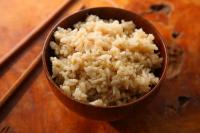
following article contains helpful education regarding natural health. It is to be viewed as
a guide, and not as a prescription or a method of diagnosing medical conditions and/or
treatments.
Part I:
Many women are uninformed about what their bodies need nutritionally in order to maintain
hormone balance.
Unless we have been avoiding the news, we have all heard about the potential dangers of
chemical hormone replacement therapy. So where does this place women who need help
with female issues and do not want to take chemical therapies? The intention of this article
is to enlighten women about their choices.
Initially, let's become acquainted with hormone activity during the monthly cycle. With day 1 of
the cycle being the first day of menstrual bleeding, days 1 - 3 have very little hormone activity.
Days 3 - 13 are estrogen dominant. Days 15 - 28 are progesterone dominant. If the body
does not detect pregnancy around day 22, hormone levels drop and bleeding begins the cycle
at day 1 again. If a pregnancy is determined, progesterone levels remain high until labor
begins.
One of the amazing qualities of progesterone is that it selectively recognizes and eliminates
foreigners in the body. This despite the fact that ½ of the DNA of a fetus is foreign to the
mother's body. Progesterone is also a precursor to cortisone, estrogen, and testosterone.
When hormonal balance is disturbed we will often see constipation and a weakened liver.
The liver is then unable to eliminate excess hormones.
Estrogen - Estrogen is not a single hormone but is the name of a family of hormones.
Estradiol is the strongest and therefore hardest to process and eliminate excesses, estrone
is the second in terms of strength, and estriol is the weakest and easiest to eliminate. A plant
based supplement that is proven to take the stronger estrogens (estradiol and estrone) and
convert them to a weaker form is called Indole 3 Carbinol. This supplement is very helpful
through this conversion, by aiding the liver in its job of ridding the body of excess estrogen.
Estrogen will slow down by 50% after menopause. It has been discovered by the
scientific/medical community that estrogen can stimulate breast tissue growth, increases
body fat, can cause salt and fluid retention (here is one reason that hormones are given to
livestock ), it increases blood clotting, decreases libido, impairs blood sugar control, can
cause zinc loss as well as copper retention, interferes with iron
absorption - thereby causing rage problems during PMS. Estrogen can decrease vascular
tone, and it slows bone loss. Blood sugar irregularities, or hormone related hypoglycemia,
can occur during the estrogen dominant part of the cycle.
It is interesting that progesterone will offset all of the above effects.
Estrogen is a central nervous system stimulant and progesterone is a CNS depressant.
Progesterone is a precursor to hormones produced in the adrenals and thyroid. It has anti-
inflammatory properties and is necessary for healthy myelin sheaths of the nerves. While
estrogen retards bone loss, progesterone actually governs the speed at which bone cells
grow. Osteoclasts carry away old bone cells and osteoblasts make new bone cells. You can
see here the incredible value of our hormones to numerous body processes!
There have been found to be several categories of PMS:
PMS A in which anxiety, irritability and insomnia are problematic. 65 -70% of women have
this type, in which progesterone is insufficient. Progesterone creams applied to the skin are
helpful. In this type, fat digestion is
often poor, and so increasing the omega 3 fats and
adding lipase after meals can be helpful.
PMS C often manifests with headaches, fatigue, and food cravings. 33% of women suffer
from this. It is helpful to avoid simple refined sugars, add a good B complex vitamin, as well
as the digestive enzyme, amylase to help digest carbohydrates and sugars.
PMS D in which depression, forgetfulness, and confusion are common. 25 to 35% of women
experience PMS D. This is a condition of excess progesterone. Lead toxicity is often
common. A wonderful herb which pulls heavy metal toxins from the body is called Algin and is
a derivative of the sea vegetable, kelp.
PMS H generally exhibits hyper hydration, or water weight gain. It is important to stop any
caffeine consumption. Add natural sources of sodium to your diet, such as celery. Organic
sodium is a natural diuretic and will get rid of excess water; whereas, table salt and caffeine
cause the body to retain water.
A woman can experience a combination of the above types of PMS.
One suggested recipe of supplementation is the following:
Each day take a full spectrum source of digestive enzymes, B complex vitamin, and at least
two red raspberry capsules. This is not a prescription by any means, but a suggestion which
will help to restore hormone balance.
Red Raspberry Leaves
Red raspberry is a wonderful general women's tonic. It contains calcium, iron, manganese,
phosphorus, vitamins A, B, C, D, E, F, and G.
Women often experience cravings for chocolate. This is an indication of a need for
manganese. Chocolate does contain manganese, but is not the best source of the mineral.
Red Raspberry Leaves will provide the necessary manganese and hopefully reduce
chocolate cravings.
Protein Poor protein digestion, as well as not enough protein, is probably the #1 reason
for hormone imbalance. Protein is responsible for the composition of our enzymes, and
enzymes are catalysts for absolutely everything happening in the body. Our hormones are
made of protein and are carried by fat. Among other things, protein provides antibody
production, it balances pH of the blood, is responsible for growth and maintenance, and it
balances our fluid and electrolytes.
If you are receiving an adequate amount of protein in your diet, the next place to look is at your
digestion. Here's an easy way to discover about your personal ability to digest protein: Rub
the TMJ muscle; this is the muscle where your upper and lower jaw join, and just below and
slightly in front of the ear lobe. Rub this in a circular motion with a good amount of pressure,
six or seven times. If you feel a residual soreness, you can bet that you are not properly
digesting proteins.
Some Signs of Protein Deficiency - You will find it hard to relax mentally, tend to be hyper
active, you may notice more watery secretions and excess saliva, difficulty in focusing, protein
deficient people are frequently cold with a big appetite, and it is common to have disc
problems in the back.
Here is a good formula to decide how much daily protein you require in grams: Take your
body weight in pounds x 9, divide by 2.2 = grams per day of protein.
The enzyme that specifically digests protein is protease. Hydrochloric acid is produced in the
stomach and is necessary in that beginning process of protein break down. Some people
may need a combination of both protease and HCL.


